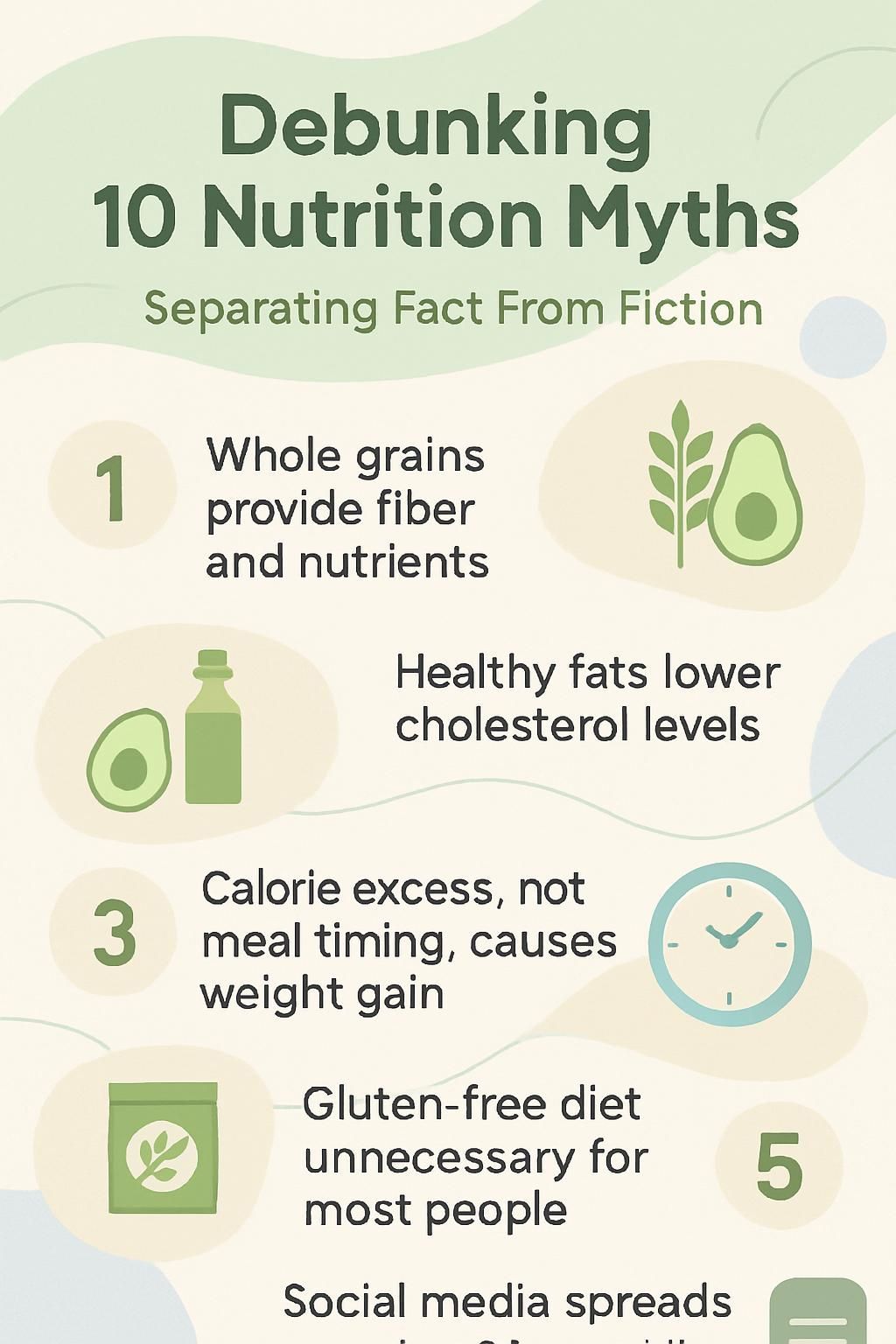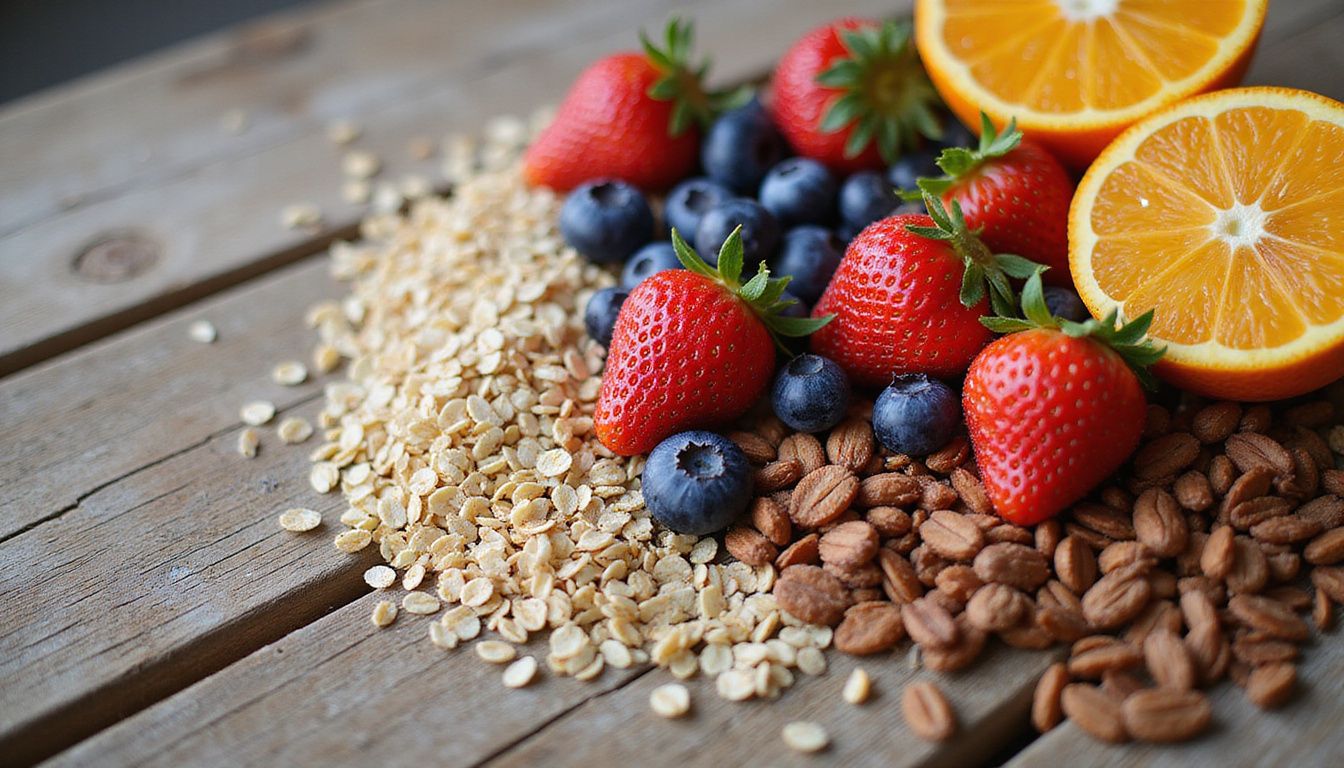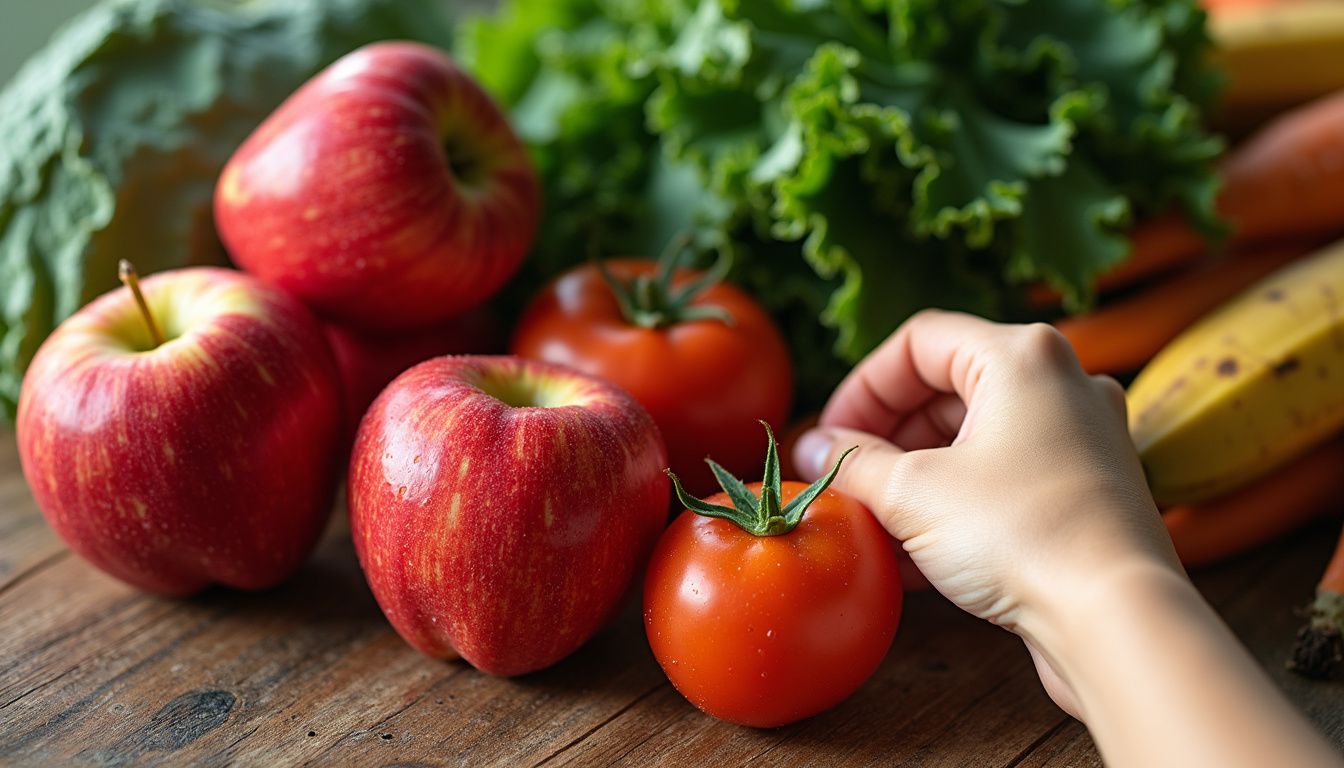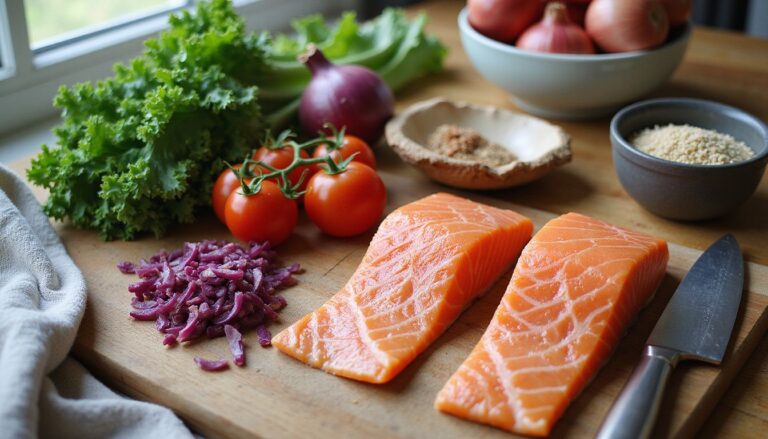Debunking 10 Nutrition Myths: Separating Fact From Fiction
Our Nutrition Assistant AI Suite will transform your body. You will lose fat, get toned, and build muscle. Gain confidence and optimal health.
You see nutrition myths everywhere, from social feeds to chats with friends. Some claims, like “all carbs are bad,” can push you away from foods that help you feel strong.
This guide breaks down 10 common nutrition myths with clear facts, simple science, and practical tips. Use it to choose meals that support energy, heart health, and weight goals. Keep reading to see which advice holds up and which does not.
Key Takeaways
- Carbohydrates are not all harmful. Whole grains, fruits, and vegetables supply fiber and key nutrients that support energy, heart health, and blood sugar control.
- Healthy fats such as olive oil, nuts, and seeds can lower LDL cholesterol. Low-fat or fat-free items often add extra sugar to boost taste (Journal of the Academy of Nutrition and Dietetics).
- Meal timing has limited impact on weight gain. Taking in more calories than you burn, day after day, leads to weight gain regardless of the clock (Leslie Bonci, MPH, RDN).
- A gluten-free diet is needed only for celiac disease or proven gluten sensitivity. Avoiding wheat without a diagnosis can reduce fiber and B vitamins (Celiac Disease Foundation).
- Misinformation spreads fast online. Use evidence-based guidance from Registered Dietitian Nutritionists and current research when choosing diet strategies.

Carbohydrates and Their Role in Nutrition

Carbohydrates are your body’s main energy source. Choosing nutrient-dense carbs, like whole grains and fruit, supports steady energy and a healthy eating pattern.
Why aren’t all carbohydrates bad?
Fruits, vegetables, beans, and whole grains provide carbohydrates that fuel your brain and muscles. These foods also deliver fiber, vitamins, and minerals that many refined products lack.
Very low-carb plans can cut calories fast, yet removing all carbs may cause nutrient gaps and low energy over time. Added sugars in soda and candy act differently than natural sugars in whole fruit, which come with fiber and antioxidants.
Research links whole-grain carbs with a lower risk of type 2 diabetes compared with refined grains. After I switched from white bread to whole wheat, my energy lasted longer through the afternoon.
Not all carbs are equal. Favor whole grains, beans, vegetables, and fruit for lasting health.
How do whole grains benefit a balanced diet?
Whole grains, such as oats, brown rice, barley, and whole-wheat pasta, keep their fiber and B vitamins. This fiber supports heart health and helps steady blood sugar.
You feel fuller longer after eating high-fiber grains, which can make weight management easier. The Dietary Guidelines for Americans advise that at least half your grains be whole.
Even enriched white rice has some added nutrients, yet it lacks the fiber of whole grains. Making simple swaps, like whole-wheat bread for white bread, improves nutrition without extra calories.
Does Eating Fat Cause Weight Gain?
Dietary fat has many jobs, from carrying vitamins to helping you feel full. The type and amount of fat matter more than fear of fat itself.
What are healthy fats and their benefits?
Unsaturated fats from olive oil, avocados, nuts, seeds, and fish support heart health. Your body uses these fats to absorb vitamins A, D, E, and K.
Nuts add protein and vitamin E, and avocados provide fiber with monounsaturated fat. Including healthy fats can improve flavor and satisfaction without causing weight gain if calories fit your needs.
Studies suggest replacing saturated fat with unsaturated fat may lower LDL cholesterol (National Institutes of Health). Small tweaks like using extra-virgin olive oil in place of butter can help.
How do saturated and unsaturated fats differ?
Saturated fats come mainly from fatty meats, butter, and high-fat dairy. They can raise LDL cholesterol, which may raise heart disease risk. Many guidelines suggest keeping saturated fat under 10 percent of daily calories.
Unsaturated fats are found in plant oils, nuts, seeds, avocados, and fish. These fats can lower bad cholesterol and support brain function.
Choosing olive oil for cooking, eating more fish, and adding beans or tofu to meals are simple ways to reduce saturated fat while keeping meals satisfying.
Why Are All Calories Not Created Equal?
Calories measure energy, yet the source of those calories affects hunger, health, and cravings.
How does calorie quality affect health?
One hundred calories from vegetables or yogurt, which include fiber or protein, affect your body differently than 100 calories from candy. Nutrient-dense foods help you feel full and deliver vitamins and minerals.
Highly processed foods often contain added sugar and sodium. These “empty calories” can make you want more food, which may lead to weight gain.
Diets rich in whole grains, nuts, and lean proteins support a healthy metabolism and steady blood pressure (National Institute of Diabetes and Digestive and Kidney Diseases). Choosing smart snacks, like fruit or nuts, can protect energy without excess sugar.
What is the difference between nutrient-dense and empty calories?
Calorie quality depends on the nutrients packed into each bite. Nutrient-dense choices include fruits, vegetables, lentils, yogurt, soy foods, nuts, and whole grains. They deliver vitamins, minerals, fiber, and protein. Empty calories come mostly from sugary drinks and ultra-processed snacks.
Summary table
| Food Example | Approx. Calories | Nutrient Level |
|---|---|---|
| Apple, medium | ~95 | High |
| Canned fruit in syrup | ~110 | Low |
| Whole-grain bread, 1 slice | ~70 | Moderate |
| Soda, 12 oz | ~150 | Very low |
Last year I swapped packaged snacks for fruit during lunch breaks. My energy stayed higher through the afternoon.
Does Eating Late at Night Lead to Weight Gain?
Many people blame the clock for weight gain. The bigger driver is how much you eat across the full day.
Is meal timing a factor in weight gain?
Eating after 7 p.m. does not cause automatic weight gain. You gain weight when calories in exceed calories out, no matter when you eat.
Late-night snacking can add extra calories, especially if you eat while bored or distracted. Screen time often leads to mindless eating of chips, candy, or sugary drinks. Pause to ask if you are truly hungry and plan a balanced snack if needed.
How important is overall calorie consumption?
Total daily intake is the strongest factor for weight change. Experts, including Leslie Bonci, MPH, RDN, report that a sustained calorie surplus leads to weight gain regardless of timing.
If you want to lose weight or maintain it, focus on portions, protein, and fiber. Use your nutrition facts label and activity level to guide daily targets. Meal timing can support routine, yet the calorie balance is what moves the scale.
Are Detox Diets Necessary for Health?
Bold claims about detox plans sound appealing. Your body already has a built-in system that clears waste every day.
How does the body naturally detoxify?
Your liver, kidneys, and digestive tract handle detox. The liver changes toxins into safer forms, the kidneys filter blood and make urine, and the gut removes waste through stool.
No strong evidence shows that juice cleanses or detox diets improve this process. A balanced pattern with whole grains, fruits, vegetables, lean proteins, and water supports what your body already does well.
What are the risks of detox diets?
Detox plans often slash calories and cut out whole food groups. You may miss protein, healthy fats, and key vitamins. This can cause fatigue, headaches, dizziness, and muscle loss.
Fast weight drops are usually water, not fat, and the weight often returns. Prolonged restriction may slow your metabolism. Nutrition research classifies most detox diets as unbalanced and short-lived.
Choose whole foods and steady habits instead of strict cleanses. Your natural detox system works best with regular, nourishing meals.
Is Gluten Unhealthy for Everyone?
Gluten is a protein found in wheat, barley, and rye. It is a problem for specific conditions, not for everyone.
When should gluten be avoided?
People with celiac disease must avoid gluten completely. Gluten triggers an immune response that harms the small intestine. About 1 percent of Americans live with this condition (Celiac Disease Foundation).
Some people have non-celiac gluten sensitivity and feel better without gluten. A healthcare provider can help confirm this with testing. A close friend improved years of fatigue after a confirmed diagnosis and a gluten-free diet.
If you do not have celiac disease or proven sensitivity, skipping gluten can lower fiber and B vitamins. Many wheat foods are valuable sources of these nutrients.
What are common myths about gluten-free diets?
Gluten-free does not always mean healthier. Many gluten-free products rely on refined starches and added sugars. That swap can reduce fiber and key nutrients.
Whole-wheat foods, which contain gluten, add fiber and B vitamins to your day. Unless medically needed, experts suggest keeping gluten-containing whole grains in a balanced diet.
Are Low-Fat or Fat-Free Products Always Healthier?
Labels can mislead. Reducing fat in a product often means adding sugar, salt, or starch to replace taste.
Do low-fat products contain hidden sugars?
Many low-fat and fat-free items replace flavor with added sugar or sodium. For example, fat-free yogurt can have 20 to 25 grams of sugar per serving, while regular yogurt often has less.
Low-fat dressings and peanut butter may show higher sugar on the nutrition label than their regular versions. Research in the Journal of the Academy of Nutrition and Dietetics reports that many “low-fat” or “fat-free” items include extra sweeteners.
Years ago I chose lots of low-fat products and noticed I felt hungry again soon. The hidden sugar did not keep me satisfied.
Why might full-fat options be better?
Full-fat foods can increase satiety, which may reduce snacking. Full-fat dairy supplies protein and calcium without extra sugar often found in low-fat versions.
The science has shifted. Aim to choose the right kinds of fat instead of fearing all fat. For some people, switching from skim milk to whole milk helps control cravings while meeting nutrition needs.
Is Fresh Produce Always Better Than Frozen or Canned?
Convenience can support healthy eating. Frozen and canned produce can be just as nutritious as fresh.
How well do frozen and canned produce preserve nutrients?
Frozen produce is picked at peak ripeness and quickly frozen, which locks in nutrients like vitamin C and potassium. Studies show many vegetables and berries keep high nutrient levels after freezing.
Canned foods are processed soon after harvest, which preserves many vitamins and minerals. Lycopene, an antioxidant in tomatoes, is even more available in canned tomatoes than in raw ones.
Some heat-sensitive vitamins decline during canning, yet minerals and fat-soluble vitamins usually stay stable. These options make it easier to get enough plants, especially on busy days.
Can convenience come without losing nutrition?
Yes. Choose frozen or canned options with no added sugar or salt. Flash-frozen vegetables hold nutrients well, and steaming them at home keeps quality high.
I often keep plain frozen broccoli on hand for quick dinners. It tastes fresh after steaming, and the nutrition holds up compared with produce that sits for days.
Should You Avoid Eating Egg Yolks?
Egg yolks carry more than cholesterol. They deliver protein, vitamins, and minerals in a small, budget-friendly package.
What are the nutritional benefits of egg yolks?
One large egg has about 70 calories and 6 grams of protein. The yolk provides vitamin D for bones and immunity, plus choline for brain health and iron for oxygen transport.
Eating the whole egg gives you the full nutrient package, not just the protein in the white. For many people, eggs fit well in a balanced meal plan.
Are cholesterol concerns about egg yolks justified?
Current research shows dietary cholesterol affects blood cholesterol less than once thought. The 2015–2020 Dietary Guidelines for Americans removed the daily cap on cholesterol from food.
For most healthy people, eggs do not raise heart disease risk when eaten as part of a balanced diet. Experts at major medical centers also support moderate egg intake for healthy adults.
On hectic days, eggs help me get quick protein without hurting my goals. That matches recent findings: most people can include eggs without raising heart risk.
Do You Need Meat to Get Enough Protein?
Meat is one source, not the only one. A plant-forward pattern can cover your protein needs with smart planning.
What are good plant-based protein sources?
Plants contain all 20 amino acids. You can meet daily needs with a mix of foods.
- Tofu, made from soybeans, offers about 10 grams of protein per half cup. Add it to stir-fries or salads.
- Tempeh, a fermented soy product, delivers about 15 grams per half cup and includes minerals like iron.
- Unsweetened soy milk provides around 7 grams per cup and works in cooking or cereal.
- Beans, such as black beans, chickpeas, or kidney beans, supply 6 to 8 grams per half cup cooked.
- Lentils give about 9 grams per half cup cooked and include fiber that supports fullness.
- Miso is a fermented soybean paste with protein and probiotics. Use it to season soups or vegetables.
- Nuts, including almonds, walnuts, and peanuts, offer 4 to 7 grams per ounce along with healthy fats.
- Whole grains like quinoa provide up to 8 grams per cooked cup and deliver steady energy.
- Seitan, made from wheat gluten, packs about 20 grams per 3-ounce serving and has a meat-like texture.
Mix these foods across the day to support muscle repair, hunger control, and steady energy.
What are the benefits of a plant-forward diet?
Research links plant-forward eating with lower risks of obesity and heart disease. These meals are rich in fiber, vitamins, and minerals without the higher saturated fat found in many meat-heavy diets.
Vegetarians can meet protein needs with beans, lentils, tofu, eggs, dairy, nuts, and seeds. Weight loss still depends on a calorie deficit, so portions and snacks matter.
How Can You Spot Nutrition Myths?
Bold claims often lean on anecdotes instead of solid data. A quick check can save you time, money, and frustration.
What role does scientific evidence play?
Scientific evidence separates myth from fact. Clinical trials and large studies test which foods and nutrients help or harm health.
Public databases, such as ClinicalTrials.gov, track ongoing studies so results can be reviewed. Trust guidance that cites peer-reviewed research and recognized organizations.
How to avoid misinformation from unreliable sources?
- Check credentials. Look for Registered Dietitian Nutritionists or licensed healthcare professionals.
- Compare advice across trusted groups like the Academy of Nutrition and Dietetics or government health sites.
- Read original sources when you can, and look for peer-reviewed citations.
- Skip posts that promise extreme results or use fear about common foods.
- Be wary of viral trends on TikTok, Instagram, or YouTube that lack supporting evidence.
- Check dates. Newer research may update older claims.
- Ask a credentialed professional before making major diet changes.
These habits help you sort useful tips from loud noise.
How Can You Build a Balanced Diet?
Building a balanced plate does not require perfection. Small changes add up, especially when they become routine.
Why prioritize variety and moderation?
Variety helps you cover your nutrient bases. Different foods supply different vitamins and minerals, such as calcium for bones and iron for blood.
Moderation supports long-term habits. Enjoy a treat now and then while making most meals from whole foods. Watching portions helped me meet my goals without feeling deprived.
Why choose whole, unprocessed foods?
Whole foods such as fruits, vegetables, whole grains, beans, nuts, and healthy fats come with fiber and antioxidants. Diets rich in these foods link to lower rates of heart disease and type 2 diabetes.
Packaged foods often hide extra sugar or sodium. Simple meals like brown rice with beans and vegetables can be fast, affordable, and filling.
What Are Common Questions About Nutrition Myths?
Questions spread faster than facts. A few checkpoints can help you decide what to try and what to skip.
How do nutrition myths spread?
Social media makes it easy to share catchy claims without context. For instance, advice to shop only the store perimeter ignores healthy foods in the aisles, like beans, whole grains, nuts, and canned fish.
Myth posts often skip sources or misuse studies. At a store last week, someone told me to avoid inner aisles, yet they missed low-sodium canned vegetables and salmon packed in water.
How can you verify nutrition claims?
Read the nutrition label for added sugars, sodium, and long ingredient lists. Search for guidance from the CDC, FDA, or peer-reviewed journals before changing your diet.
Seek help from a registered dietitian or your healthcare provider, especially if a claim recommends cutting whole food groups. I passed on “low-fat” snack bars once I saw the added sugars on the label.
Conclusion
Separating fact from fiction helps you make confident choices. Focus on nutrient-dense foods, whole grains, and healthy fats, and watch your total calories to manage weight gain.
Use evidence-based advice, read labels, and ask qualified professionals when you need help. This article is for general education, not medical care. For personal guidance, consult a healthcare provider or a Registered Dietitian Nutritionist.
FAQs
1. What are some common nutrition myths that people believe?
Many people think carbohydrates always cause weight gain, all fats are unhealthy, eating late at night leads to fat gain, and sugar from fruit is as harmful as added sugars. These beliefs often spread without scientific support.
2. How can I tell if a nutrition claim is a myth or fact?
Check for evidence from credible sources like peer-reviewed studies or registered dietitians. Reliable information usually includes data or references to research instead of personal opinions.
3. Does eating after 8 p.m. really make you gain weight?
Current research shows total daily calorie intake matters more than meal timing for body weight management. Eating late does not automatically lead to fat gain if your overall calories remain balanced.
4. Why do so many nutrition myths persist despite new evidence?
Nutrition myths continue because of social media, outdated advice, and misunderstanding of science terms by the public. Personal stories may seem convincing but lack scientific proof; this makes it important to rely on verified facts rather than trends.
Summary: Nutrition myths often come from misinformation and lack strong scientific backing. Using trusted sources helps separate fact from fiction in healthy eating choices.







